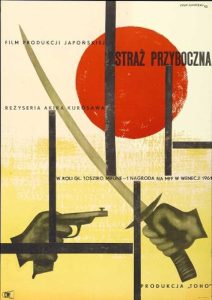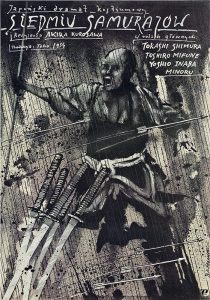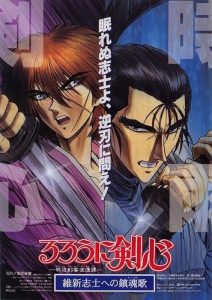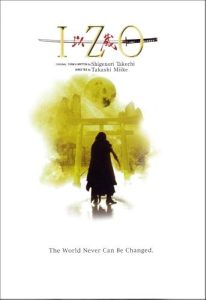"Ran" is a masterpiece that delves into the complex dynamics of power, loyalty, and betrayal in Medieval Japan. If you were blown away by this epic film, get ready to be captivated by these 16 mind-blowing movies that explore similar themes in their own unique and mesmerizing ways. Get ready to embark on a cinematic journey that will leave you breathless.
1) Yojimbo

Yojimbo is a classic samurai action film that is often imitated but never equaled. Toshirô Mifune creates a memorable character in the ronin who decides the course of his life on the toss of a stick, and ends up risking his life to save a village full of peasants he finds revolting. The motives of "Yojimbo's" actions remain open to interpretation, adding depth to the film. The skillful direction keeps the pace of the storytelling tight and tells most of the story through images. In fact, this film is so good that it can be watched as a silent film without losing much of its impact or meaning. Interestingly, Kurosawa's influence can be seen in many other movies, including Clint Eastwood's "Man with No Name" character in Sergio Leone's films and Eastwood's own directorial work, "High Plains Drifter.
2) Kagemusha

Kagemusha: A petty thief with an utter resemblance to a samurai warlord is hired as the lord's double. When the warlord later dies, the thief is forced to take up arms in his place. What happens to the doppelganger when the original dies? Does he flitter out of existence or does he find his own? Tatsuya Nakadai brilliantly plays both roles of Shingen and the thief. The thief is trained to fill in as Shingen's double, a position previously played by his brother Katsuyori. The relationships between the thief and the Lord's men make this a fascinating film. There is a rich tapestry of multidimensional characters. The intimate circle of Shingen's family and guard knows about the double. They advise him about how to be like Shingen. He plays the part well. The backing of Kagemusha helped Nobukado's one great military victory.
3) Seven Samurai

Seven Samurai, also known as Shichinin no samurai, is a film that shares some striking similarities with Ran. Both movies are Japanese masterpieces directed by the legendary Akira Kurosawa. While Ran explores the themes of nihilism, samurai, and battles in medieval Japan, Seven Samurai takes us back to the 16th century, where farmers from a village hire a veteran samurai to protect them from bandits. Both films delve deep into the complexities of honor, loyalty, and the consequences of violence. However, what sets Seven Samurai apart is its iconic status in the history of cinema. Considered the Japanese equivalent of Orson Welles' Citizen Kane, it is widely recognized as one of the greatest films ever made. The story of the samurai teaching the villagers to defend themselves against the bandits is a true cinematic poetry, filled with rich emotion that words fail to describe.
4) Sanjuro

Sanjuro is a delightful movie that will transport you back to feudal Japan. This film is a sequel to 'Yojimbo' and features the charismatic Toshiro Mifune as the cunning ronin, Sanjuro Tsubaki. Similar to its predecessor, Sanjuro revolves around a group of samurai who are determined to fight corruption. When the uncle of one of the samurai is framed and imprisoned by a corrupt superintendent, Sanjuro steps in to help them. The movie is filled with humorous moments and showcases Sanjuro's cleverness as he relies more on his wits than his sword to outsmart his enemies. While Sanjuro is reminiscent of Ran in terms of its samurai theme, it differs in tone and focuses more on comedy and clever tactics rather than epic battles and family dynamics.
5) Harakiri

Harakiri, also known as Seppuku, is a captivating film that you should definitely watch if you enjoyed Ran. Both movies share the common theme of samurai culture and the consequences of power. In Ran, an elderly warlord's decision to divide his empire among his three sons leads to corruption and betrayal. Similarly, Harakiri tells the story of a ronin who arrives at a feudal lord's palace to commit seppuku, only to reveal the intertwined pasts and challenge the clan's integrity. While Ran focuses on the internal power struggles within a family, Harakiri explores the hypocrisy of authoritarianism. Both films feature stunning visuals and intense performances, with Tatsuya Nakadai delivering his greatest performance ever in both movies. If you're a fan of samurai flicks, Harakiri is a must-watch and will rank among the finest films you've ever seen.
6) The Hidden Fortress

The Hidden Fortress: I'm not sure that it is helpful knowing that George Lucas found inspiration for his "Star Wars" films in Kurosawa's historical epic, "The Hidden Fortress" (1958). Oh, there are a number of matters of content that seem quite similar. Though Kurosawa's story takes place in sixteenth century Japan and Lucas sets his in space in the future, the basic struggles are the same - the restoration of power to a princess and her clan. Some would compare Toshiro Mifune's General Rokurota Makabe to Harrison Ford's Hans Solo in "Star Wars" (1977), though there may be more commonality shared with Mark Hamill's Luke Skywalker. And the two peasant farmers, pawns in the turmoil of sixteenth century Japanese civil wars, are easily identified as precursors of the "Star Wars" droids, R2-D2 and C3PO.
7) Heaven and Earth

Heaven and Earth, also known as Ten to Chi to, takes us to 16th century Japan, where two samurai engage in massive battles across the countryside. The film showcases visually stunning landscapes and skies that are beyond beauty. The massive battle scenes are nothing short of epic, conveying a believable sense of thousands of soldiers in simultaneous combat. The armies are color-coded, creating mesmerizing masses of moving color and light. However, while the film excels in its visuals and battle sequences, it falls short in terms of storytelling. The attempt to personalize the leaders of each army feels like a mere formality, and there is a lack of well-developed characters like those found in great war movies such as "Ran" or "Lawrence of Arabia." Instead, we are told that these people have enmity for each other and that there is a reason for battle, leaving us less invested in the outcome.
8) The Sword of Doom

The Sword of Doom is reminiscent of Ran, as both films delve into the world of samurai and the consequences of their actions. While Ran explores the corruption and downfall of a warlord and his sons, The Sword of Doom focuses on a sociopathic samurai who leaves a trail of vendettas in his wake. Both movies showcase the complexities of the samurai code and the violence that accompanies it. However, The Sword of Doom stands out with Tatsuya Nakadai's exceptional performance, which is equally as captivating as his role in Ran. The film also features a memorable fight scene in a snowstorm, which Quentin Tarantino borrowed for Kill Bill. Although The Sword of Doom is part of an unfinished trilogy, its narrative is still moving and leaves the audience longing for more. So, if you enjoyed the dark and thought-provoking world of samurai in Ran, The Sword of Doom is a must-watch that will leave you craving for more intense sword duels and compelling performances.
9) Hitokiri

Hitokiri is reminiscent of Ran, as both movies fall under the genres of Action, Drama, and History. While Ran is a visually stunning masterpiece that explores the corruption of power and the destructive nature of war, Hitokiri focuses on the story of a destitute ronin who allies himself with a ruthless clan. The similarities between the two films lie in their shared themes of samurai and Japanese history. However, where Ran delves into the complexities of familial relationships and the consequences of unchecked power, Hitokiri focuses more on the inner torment of its characters and the violence they perpetrate. While Hitokiri may not provide a comprehensive history lesson like Ran, it still offers an intriguing glimpse into a specific period in Japanese history and is worth watching for fans of samurai films.
10) The Fall of Ako Castle

The Fall of Ako Castle, also known as "Akô-jô danzetsu", is reminiscent of Ran in its portrayal of the samurai culture and the honor code that governs it. Both movies delve into the themes of loyalty, revenge, and the consequences of unchecked power. However, while Ran explores the internal power struggles within a family, The Fall of Ako Castle focuses on a group of samurai seeking vengeance for the downfall of their Lord. The Fall of Ako Castle is an epic tale based on true events, showcasing the legendary story of the 47 ronin. With a runtime of just under 3 hours, it takes its time to develop the characters and the plot, making it a must-watch for fans of Japanese folklore and samurai movies. The movie builds up to an intense and visually stunning battle scene, choreographed by the legendary Sonny Chiba.
11) The Challenge

The Challenge is reminiscent of Ran in many ways. Both movies take place in Japan and involve samurai and sword fights. However, while Ran is a grand epic about a warlord and his three sons, The Challenge tells the story of a down-and-out American boxer who becomes involved in a feud between two Japanese brothers. Ran is a visually stunning masterpiece, with powerful imagery and a sophisticated sound design that deeply influenced cinema worldwide. On the other hand, The Challenge is a fast-paced action movie with plenty of gore and a great story of two brothers fighting over ancient family swords. While Ran is a cautionary tale about the destructive power of war, The Challenge is a thrilling and entertaining martial arts film. If you enjoyed the epic scale and artistry of Ran, you should watch The Challenge for its action-packed story and impressive fight scenes.
12) Shogun's Shadow

Shogun's Shadow is reminiscent of Ran, as both movies are set in feudal Japan and revolve around the samurai culture. While Ran explores the themes of power, corruption, and family rivalry, Shogun's Shadow follows a small group of heroes on a mission to protect a young boy who is next in line to become the Shogun of Japan. The story of Shogun's Shadow is driven by the tension between the boy's father, the Mad Shogun, who tries to prevent his son from ascending to power, and the heroes who must ensure his safe journey to a sacred temple. Similar to Ran, Shogun's Shadow features intense swordplay action and other thrilling scenes, making it a must-watch for fans of pop-samurai action. Although Sonny Chiba's role as the main villain is unfortunately limited, the film compensates with its immersive storytelling and captivating adventure.
13) Rônin-gai

Rônin-gai, released in 1990, bears some resemblance to the classic film Ran. Both movies fall under the action and drama genres and share the common theme of samurai warriors. However, that's where the similarities end. While Ran is an epic tale of power and corruption, Rônin-gai takes a different approach by focusing on a group of masterless samurai living in Edo's red light district. Despite the promising storyline, Rônin-gai falls short in execution. The editing and camera-work lack excitement, and the characterizations never fully reach their potential. It's a shame that the director, who claims to be inspired by Kurosawa's work, fails to capture any of the magic that made Ran a masterpiece. Nevertheless, if you're a fan of samurai films and looking for a different take on the genre, Rônin-gai might be worth a watch.
14) Samurai Banners

Samurai Banners takes us back to 16th century Japan, where a shrewd samurai helps a daimyo expand his realm. Directed by Hiroshi Inagaki, known for The Samurai: Musashi Miyamoto trilogy, this nearly three-hour epic stars Toshiro Mifune as a ronin determined to achieve greatness by uniting Japan under one ruler. Based on a novel adapted by Shinobu Hashimoto, Samurai Banners immerses us in the Sengoku warring period with its massive fight scenes and colorful visuals. While it immediately brings to mind Akira Kurosawa's samurai masterpieces Kagemusha and Ran, it's interesting to note that Kurosawa wasn't involved in this project, despite sharing his former leading man and scriptwriter. Nonetheless, Inagaki, along with cinematographer Kazuo Yamada, delivers a stylish and dynamic film that captures the essence of feudal Japan.
15) Rurouni Kenshin: Requiem for the Ishin Patriots

"Rurouni Kenshin: Requiem for the Ishin Patriots" is reminiscent of "Ran" in its exploration of the consequences of power and the impact of war. While "Ran" takes place in Medieval Japan and centers around an elderly warlord and his three sons, "Rurouni Kenshin: Requiem for the Ishin Patriots" is set after the war against the Tokugawa Shogunate. Both films delve into themes of betrayal, revenge, and the toll of violence. However, "Rurouni Kenshin: Requiem for the Ishin Patriots" brings a unique twist by focusing on the personal vendetta of Takimi Shigure against Kenshin Himura, also known as the Hitokiri Battosai. The animation in "Rurouni Kenshin: Requiem for the Ishin Patriots" is visually stunning, with breathtaking fighting sequences and a beautiful soundtrack that adds to its emotional impact.
16) Izo

Izo takes you on a wild, surreal journey through time, space, and eternity, in search of bloody vengeance. This film is a reckless and mystical take on the ultra-bloody grind-house samurai epic. While watching Izo, you might find yourself wondering what the hell is going on, but that's part of the charm. The protagonist, Izo, is an unstoppable undead spirit on a mission of nihilistic anarchy. The director, Takashi Miike, goes all out in this project, creating a dark and Gothic exterior that serves as a backdrop for the relentless action set-pieces and violence galore. The repetition of Izo's murder sequences becomes a bit tiresome, but the creative and outrageous nature of these scenes keeps you entertained. However, the film's messages can be fuzzy and off-kilter, leaving you with a sense of overload.

